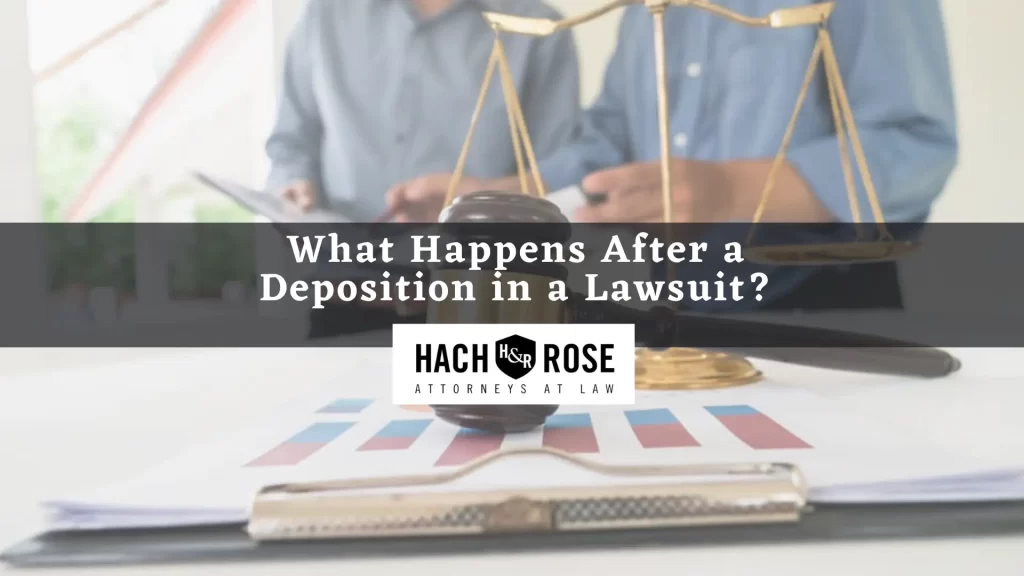
Suffering injuries in an accident can have severe consequences for both your health and your finances. In addition to the physical pain and suffering the injury can cause, you will also face overwhelming expenses such as medical bills and medication costs. You might also have to miss work while you recover, and some disabilities may prevent you from returning to your job altogether. Filing a personal injury claim can help you recover your losses and hold the at-fault party accountable for their negligence.
Most injury claims find their resolution through negotiations with an insurance company. Sometimes, however, insurers insist on undervaluing an injured person’s claim. In such cases, you may need to seek your compensation via a lawsuit. One of the early steps in a personal injury lawsuit is to sit for a deposition. Understanding more about what happens during and after this step can help you feel more prepared for your suit.
What Happens in a Deposition?
A deposition is an element of the pre-trial discovery process in a civil lawsuit. Any party or witness involved in the case can be deposed. Your deposition is an interview with the defendant’s attorney, where you will answer questions under oath about the accident and your injuries. A court reporter will be there to transcribe the lawyer’s questions and your responses.
The purpose of the deposition is to allow each side’s attorney to gather more knowledge about the causes and consequences of your accident-related injuries so that they know better how to proceed in court.
You must answer each question honestly and clearly. If you misrepresent or exaggerate any of the facts relating to your injuries, you risk perjuring yourself and harming your case. Your attorney will be beside you during the interview. Although they can’t confer with you during the deposition, they will help you prepare beforehand to frame your responses in a way that avoids inadvertently hurting your case.
What Should I Expect after the Deposition?
After the deposition, the court reporter will take a few days or weeks to prepare the official transcript. They will then submit it to the court and provide both parties’ attorneys with copies. Your lawyer can review the transcript to make sure that it accurately reflects what happened during the interview. If necessary, they can attempt to submit corrections to the court.
At this point, the defendant’s insurer may request that you have an examination with an independent physician. Confer with your lawyer in advance of this exam so they can prepare you with what to tell the doctor. You have the right to keep certain information to yourself, and staying silent on unrelated matters may benefit your claim.
your lawyer in advance of this exam so they can prepare you with what to tell the doctor. You have the right to keep certain information to yourself, and staying silent on unrelated matters may benefit your claim.
In some cases, the independent medical examination may provide more substantial evidence linking your injuries to the at-fault party’s negligence. If this is the case, your lawyer may again attempt to seek a settlement arrangement with the insurance company.
How Long After a Deposition Is Mediation?
If settlement negotiations remain unsuccessful, you might enter mediation, which is a form of alternative dispute resolution conducted by a mediator. There is no required time for engaging in mediation after a deposition. The mediation process will give you and the other side a final opportunity to find common ground for a settlement. Many New York civil courts require the parties to engage in a mediation session before going to trial.
The mediator will offer suggestions, and either party is free to accept or reject these offers. Once both parties agree to a settlement and sign a contract, the agreement becomes legally binding. If the mediation is successful, it can save everyone a great deal of time and money.
How Long After a Deposition Is Settlement?
As with mediation, there is no required time after a deposition when a settlement must be reached. If the depositions provided information that strengthens your case, the insurance company might want to settle rather than proceed to trial.
Settlement can happen at any point, as long as the two sides are conducting negotiations, engaged in mediation, or even participating in a trial right up until a verdict is reached.
Contact an Experienced New York Personal Injury Attorney
Filing a personal injury claim is never straightforward. If you believe that your claim will be heading to trial, you need an experienced and knowledgeable lawyer on your side. The seasoned New York personal injury attorneys of Hach & Rose, LLP will fight for your best interests every step of the way. Our firm has successfully represented injured New Yorkers for twenty years. We are committed to achieving the best possible results for you, whether by jury trial or settlement.
We do not charge a fee unless we get compensation for you. Call us today at (212) 779-0057 or contact us online to learn more about how we can help you.
Related posts
When Mediation is Not a Good Idea
Pros and Cons of Going to Trial
What Happens When A Lawyer Sends a Demand Letter?
